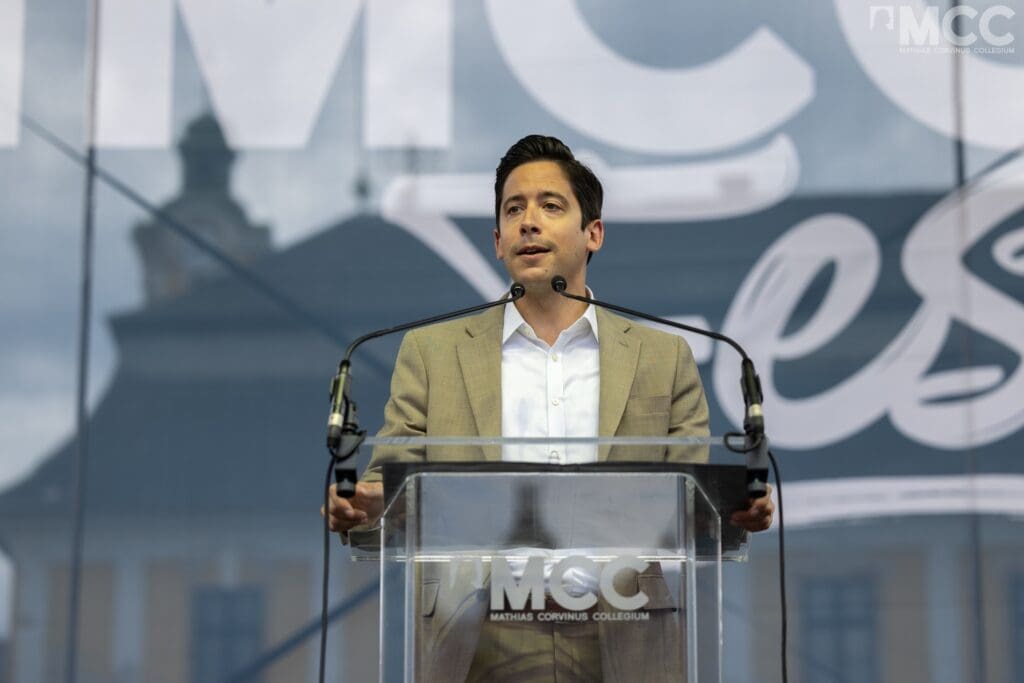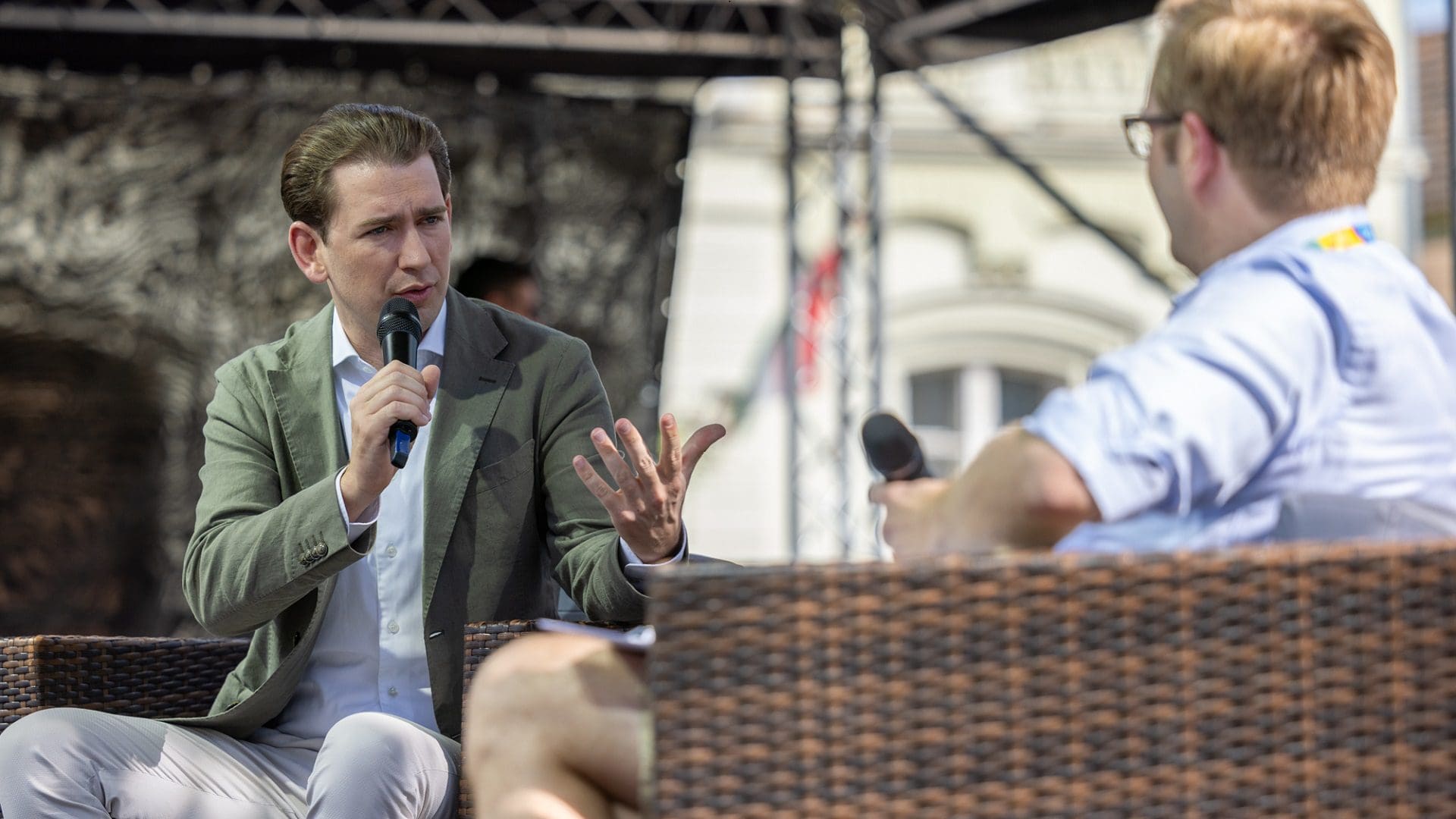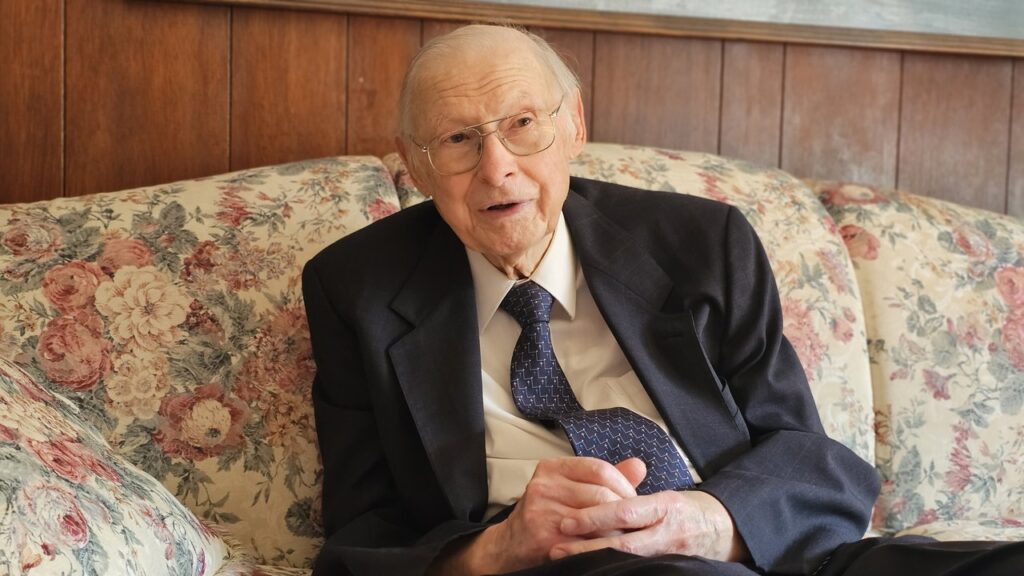Ever since the MCC Feszt 2023 schedule was revealed, the two probably most talked-about speakers have been major American political commentator Michael Knowles and Former Austrian Chancellor Sebastian Kurz. It just so happens that these two speakers took the stage back-to-back, on a Friday afternoon on Day 2 of this year’s MCC Feszt.
Michael Knowles on the False Freedom of the Addict
Michael Knowles of the Daily Wire conservative media company started his speech with the good news that his 2017 satirical book Reasons to Vote For Democrats has now been translated into Hungarian. He then went on to recall the first time Hungarian politics caught his attention, after the 2018 re-election of Prime Minister Viktor Orbán. He scoffed at the headlines by major Western media outlets bemoaning the ‘death of democracy’ in Hungary when, in Mr Knowles’ point of view, all that happened was that the Hungarian people exercised their democratic right to elect someone the Western media does not approve of.
He placed that moment in a chain of events that was the manifestation of the rise of right-wing populism in the West in the mid-to-late 2010s: Brexit, the election of Donald Trump, and the third consecutive supermajority win for PM Orbán in Hungary.
He also dedicated a great deal of his speech to the different ideas of freedom, saying:
‘The liberal conception of freedom directly contradicts the classical and Christian understanding of freedom that built our civilisation.
Liberty, as it turns out, is not the ability to do what we wish, but the right to do what we ought.
In recent decades the West has fallen for the false freedom of the addict. I know Hungary understands this fact. While countries around the West are rushing to legalise all sorts of drugs…Hungary has held the line on drugs.’
Continuing to draw a contrast between responsible and hedonistic freedom, Mr Knowles pointed to a verse in the Book of Matthew in the New Testament, where Jesus asks his followers to take his ‘yoke’ upon themselves. As Mr Knowles pointed out, this is still a yoke, however, we only have the freedom to choose between ‘the yoke of sin’, and use our liberties to chase our hedonistic impulses, or the yoke of Christ, which carries responsibilities but ultimately leads to salvation. In secular terms, Mr Knolwes implored the audience to follow their ‘higher will’ as opposed to their ‘lower will’.
He also talked about another schism in the liberal and conservative world view. Namely, that liberals view the individual as the basic unit of society, while conservatives view the family as the basic unit of society.
This line of thought was a segue into a major topic of contention for the speaker, transgenderism. Mr Knowles believes that this ideology attempts to separate the self from the body, resulting in an even further atomisation of society. He believes that these ideas are so vile that there ‘must not be any middle ground’ on them and thus transgenderism ‘must be eradicated’. He was disappointed to see some of his conservative colleagues in the US beginning to cede ground and only fight against the transitioning of minors (although some are willing to compromise even on that), whereas in his view, ‘if transgenderism is false, and it obviously is, then it is false for everyone’. However, he was happy to share that, according to public opinion polling, the approval of transgenderism has been on the decline in the US in recent years.

Returning to the topic of Hungary, Mr Knowles defended PM Viktor Orbán’s controversial 2014 claim that Hungary is ‘an illiberal democracy’. He underlined that the term ‘liberal democracy’ has only been used to describe Western democracies in recent decades. Prior to that, these countries understood themselves as ‘Christian nations’.
Therefore, as he put it, ‘when your Prime Minister declared Hungary an “illiberal democracy”, his statement reflected not a break with history, but a return to the Western tradition. A few years later, your Prime Minister followed this idea even further, and declared Hungary a “Christian democracy”. As it must be.’
He went on to state that ‘the spirit of Hungary today is Christian’, and has heaped plenty of praise on the Orbán administration’s successful family support policies as well.
Sebastian Kurz on What It Was Like to Be the Youngest Foreign Minister Ever
Sebastian Kurz had a rapid ascend to power, becoming the Chancellor of Austria at just age 31 in 2017. Since his resignation he has retired from politics entirely. He sat down with MCC director general Zoltán Szalai to have a discussion in front of a sizeable audience, which turned up and stayed captivated despite the scorching heat in the Esztergom town square.
Former Chancellor Kurz reflected on his ten years in government and stressed he is not planning on returning to the public sector. When Director Szalai asked what was the best and the worst part about his career as a public official, Mr Kurz replied that the best part was being able to work for his country and his people; while the worst part was the knowledge that no matter what decision he’d end up making, criticism and scrutiny was sure to follow.
About his unusually young age in high-level politics, he opined that it was a liability initially. However, once he got to become Minister of Foreign Affairs at just age 27, it became an asset, as it distinguished the small country of Austria— many foreign leaders wanted to meet a foreign minister ‘half their age’.
He was also in charge of Austria’s foreign affairs when the 2015 European migration crisis broke out. In fact,
Mr Kurz was among the first leading European politicians to speak out against the incessant wave of illegal migrants,
along with Hungarian Prime Minister Viktor Orbán.
Elaborating on the subject, he explained that there should be a difference in how different countries handle immigration, and how migrants who came in legally and illegally should be treated, saying:
‘You can’t compare Hungary to Austria. Austria is extremely diverse. We’ve had a lot of migration…We have many people who came to our country and integrated extremely well, and, of course, many of them contributed a lot to our economic success. But there is a big difference between people who come legally to work in a country and to contribute, and people who come illegally…and do not contribute to the society.’
Mr Kurz also stated that he had a good relationship with PM Orbán during his time in public office, and that he believes the relations between Austria and Hungary are good to this day.
Related articles:








